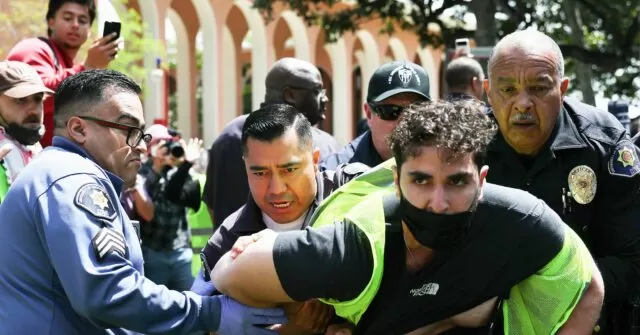The University of Southern California (USC) recently made a bold move by clearing an encampment that anti-Israel protesters had set up on its private Los Angeles campus. This decision was met with complaints from the Council on American-Islamic Relations (CAIR), a controversial organization known for its pro-terror stance. However, USC should be commended for taking a stand against hate and promoting a safe and inclusive learning environment for all students.
The encampment in question was set up by a group of anti-Israel protesters who claimed to be advocating for Palestinian rights. However, their actions were far from peaceful. They were seen hurling anti-Semitic slurs, promoting violence, and inciting hatred towards Israel and its supporters. This is not a form of peaceful protest, but rather an act of aggression that has no place on any university campus.
USC, being a private university, has the right to maintain its campus as a safe and inclusive space for all students, regardless of their political beliefs. The university’s decision to clear the encampment was not an attack on free speech, as some have claimed. It was a necessary step to ensure the safety and well-being of all students on campus.
Unfortunately, CAIR has chosen to side with the anti-Israel protesters and has condemned USC’s actions. This is not surprising, considering CAIR’s history of supporting and justifying acts of terror. This organization has been linked to numerous terrorist organizations and has been accused of promoting extremist ideologies. It is no wonder that CAIR would sympathize with a group of individuals who have shown a blatant disregard for peace and tolerance.
USC’s decision to clear the encampment is not a reflection of any bias towards a particular group or religion. It is a reflection of the university’s commitment to promoting a safe and respectful learning environment for all students. USC has a diverse student body, and it is crucial for the university to take a stand against any form of discrimination or hate speech.
It is also worth noting that USC has a strong relationship with the Jewish community and has shown support for Israel in the past. The university has a Jewish Studies program and regularly hosts events that promote dialogue and understanding between different cultures and religions. USC’s decision to clear the encampment is not a betrayal of its Jewish students, but rather a reaffirmation of its commitment to promoting a campus culture of inclusivity and diversity.
Some may argue that USC’s decision to clear the encampment was a violation of the protesters’ right to free speech. However, it is essential to distinguish between free speech and hate speech. While individuals have the right to express their opinions and beliefs, they do not have the right to promote violence and hatred towards others. USC’s actions were not an attack on free speech, but rather a necessary step to prevent hate and discrimination on campus.
In a time where hate and division seem to be prevalent, it is refreshing to see a university take a stand against it. USC’s decision to clear the encampment sends a strong message that hate speech and violence have no place on its campus. It also sets an example for other universities to follow in promoting a safe and inclusive environment for all students.
In conclusion, USC should be applauded for its decision to clear the anti-Israel encampment on its campus. This action reaffirms the university’s commitment to promoting a peaceful and respectful learning environment for all students. The complaints from CAIR should not diminish the significance of this decision, but rather serve as a reminder of the importance of standing up against hate and promoting unity. USC has set an example for other universities to follow, and we can only hope that they will follow suit in promoting a culture of inclusivity and understanding.

